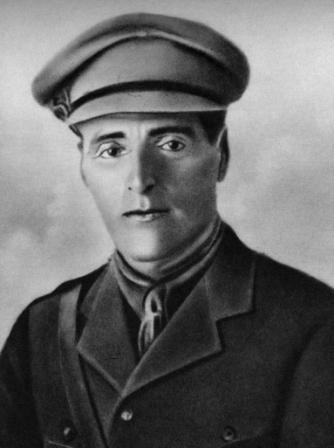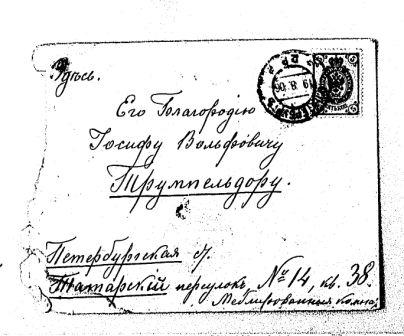 This week we mark the 11th of Adar, the Memorial Day to Joseph Trumpeldor and the fallen of Tel Hai in 1920. Ruth Baki Kolodny, a broadcaster at “Kol Israel”, a writer and a journalist, shares with us her impressions of Trumpeldor’s archive, held at the CZA:
This week we mark the 11th of Adar, the Memorial Day to Joseph Trumpeldor and the fallen of Tel Hai in 1920. Ruth Baki Kolodny, a broadcaster at “Kol Israel”, a writer and a journalist, shares with us her impressions of Trumpeldor’s archive, held at the CZA:
On a hot and moist summer day, when a mask of gloomy clouds covered Saint Petersburg’s sky and foggy steam arose from the Neva River, a carriage softly pattered its way towards the Tartar alley. When it reached “Rental Apartment House” no.14, a young princess, Gagarina, descended from the carriage. She had a matter to raise with the law student Joseph Trumpeldor, and she had come to talk to him about it. Trumpeldor was not in his room, so the princess returned to the carriage and ordered her chauffeur to return immediately to her house in the respectable Shplarnia Street. When she arrived home, she wrote Trumpeldor a short letter about her wish to meet him regarding a subject of great importance to him, and added her address and the time she would be expecting him. The princess was interested in helping him receive a larger military pension, having talked with the minister of the Nikolayev battalion.

It was on 19th of August 1906, over a hundred years ago, when writing “letters with stamps” was the main way to exchange interpersonal massages – social and political. The world was not yet virtual, and driven by instant culture, but rather by forethought, discretion and interpersonal emotion. Princess Gagarina’s letter, in her pearly and clear writing, written with a fine pen, exists at the CZA amongst hundreds of other letters in the Trumpeldor archive. One can also see the letter’s envelope which reveals Trumpeldor’s address at the time he attended law school at Saint Petersburg. He lived in a building of rental rooms built in 1904. This address was previously unknown to researchers of Trumpeldor; only Princess Gagarina’s envelop reveals it, and directs the reader to the small and poor rooms, of the kind in which Raskolnikov, the main character in Dostoyevsky’s Crime and Punishment, lived.
When Joseph Trumpeldor returned to his room that day and saw Princess Gagarina’s letter, he knew of her intentions, as apparently they had already been suggested to him. He immediately wrote a letter to his father, in which he stated that he was not interested in a promotion in the Russian Army, since he wanted to immigrate to Palestine and establish a cooperative group there. If a war should start in Palestine, he wrote, it would not matter what his rank in the Russian Army was, because in his country, Palestine, he would fight as an officer, even though he would also be willing to fight there as a plain soldier. He wrote: “I believe that the day will come and I, tired and exhausted from hard work, will gladly look upon my fields in my own country, and no one will tell me ‘Go from here, you contemptible person’, and if I fall in battle, I will be happy as I will know for what I fell.’
The files of Trumpeldor at the CZA contain hundreds of documents in Russian; they spread new light on the character of this “enigmatic hero”, and do not only tell of his heroism in battle.
To the extended story about Joseph Trumpeldor written by Ruth Baki Kolodny in “Ha’aretz” newspaper:
The notation of the record group of Joseph Trumpeldor archive is A42